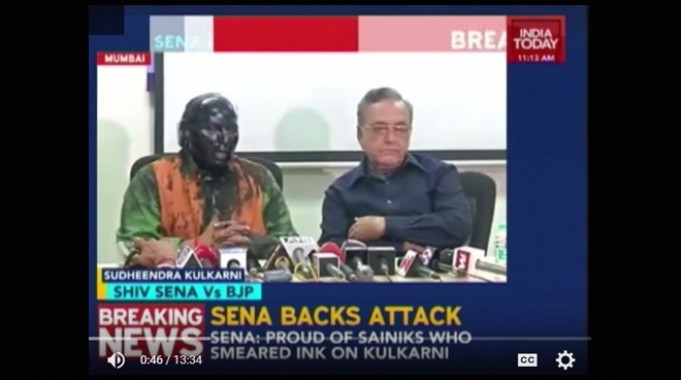Now BJP cast as free speech defender
By evening, we’ll know who blinks first – the Shiv Sena or the BJP. But however the latest standoff between the two plays out, it is high irony indeed that the battle lines between these political partners are being drawn over issues central to the freedom of expression, political, cultural and culinary.
This morning, the Shiv Sena upped the ante, with its alleged supporters blackening the face of the Observer Research Foundation’s Mumbai head, Sudheendra Kulkarni, for having the temerity to go ahead with plans to launch a book entitled 'Neither a Hawk nor a Dove: An Insider's Account of Pakistan's Foreign Policy’, by former foreign minister of Pakistan, Khurshid Mohammed Kasuri, in Mumbai. The Shiv Sena had demanded the cancellation of the book launch and Kulkarni had sought police protection and additional security to avert any possible disruption.
Given the Sena’s past record and coming in the wake of the Shiv Sena’s success in forcing the cancellation of a concert by Pakistani ghazal singer Ghulam Ali to commemorate the death anniversary of India’s ghazal singer Jagjit Singh last week, the threat of a violent disruption was definitely real. Maharashtra Chief Minister Devendra Fadnavis’s assurance that the book launch would proceed with police protection was only a red rag for the Shiv Sena and relations between the two alliance partners have plummeted to an all time low.
The Shiv Sena studiously kept away from the visit of Prime Minister Narendra Modi in Mumbai to inaugurate the Ambedkar memorial on Sunday. Sena leader and editor of the party’s mouthpiece, Saamna, Sanjay Raut, was clearly unrepentant over today’s attack on Kulkarni and said in television interviews that the ink or oil paint used to smear the face of the ORF think tank head, was more symbolic of the blood of martyrs shed in conflicts with Pakistan.
For several years now, the Shiv Sena has protested any cultural interaction with Pakistan. Citing Pakistan’s terror attacks on India, the Kargil conflict and Pakistan’s ‘rejection’ of eminent Indian artistes, the Shiv Sena was opposed to any cultural, sporting and political relations with Pakistan, said a letter from its film wing, the Chitrapat Sena, to the management of the Shanmu khananda Hall which was hosting the Ghulam Ali concert.
Since 1991, when the Sena dug up the Wankhede stadium in Mumbai to protest the tour of Imran Khan’s team and then, again in 1999, when its members dug up a cricket pitch in Delhi, the Shiv Sena has not let go any opportunity to register its antipathy to Pakistan. Leave alone Ghulam Ali, the Shiv Sena has targeted Pakistani artistes in Bollywood or in entertainment television programmes, enforced the cancellation of Pakistani singer Atif Aslam's performance in Pune this year and disrupted the press conference called by a sufi rock band Meekal Hasan at the Mumbai Press Club last year.
Sena censorship vs BJP censorship
Both the BJP and the Shiv Sena ostensibly speak for the same politics but compete for the same constituency and the BJP didn’t try very hard to contest the claim of the deceased Sena leader Bal Thackeray that he was the real ‘Hindu Hriday Samrat’.
But between 1991, when the Pakistan cricket tour was cancelled, and 1999, when the Vajpayee government ensured that the tour would go on, the Shiv Sena has also seen much of its political fortunes change. If the BJP was a minor alliance partner in Maharashtra and remained silent or distanced itself throughout its earlier protests, it is no longer so.
The Shiv Sena didn’t speak up when the Maharashtra government imposed a beef ban, but was forced to protest the subsequent meat ban in Mumbai during Paryushan, the Jain period of penance that got the tacit support of BJP leaders in the Municipal Corporation. It managed a minor rollback on the meat ban, but was unable to challenge it completely.
Now, heading the government both at the Centre and in Maharashtra, BJP spokespersons have been distancing themselves from the Shiv Sena’s protests. In April, a Ghulam Ali concert was held in the Sankat Mochan temple complex in Prime Minister Modi’s constituency in Varanasi. Earlier, the Shiv Sena opposed the release of Aamir Khan starrer ‘PK’ and the BJP followed suit, till its senior party leader L K Advani saw the film at a private viewing and endorsed its message of attacking religious charlatans.
The BJP is already battling criticism over multiple attacks on free speech in the last year by its allies and by various Hindutva forces who are close to or seen as part of the Sangh Parivar – from the killing of rationalist writer MM Kalburgi and threats to a number of writers in Karnataka, to the Maharashtra government’s inability to book culprits involved in the killing of CPI leader Govind Pansare and the censorship of films and books.
Yet, the Maharashtra Chief Minister Fadnavis is all set to put his government’s might behind the book launch as a free speech issue. And its alliance partner is determined to see it doesn’t. The outcome will be interesting for the alliance but will it make any real difference to struggles for freedom of expression in India?







